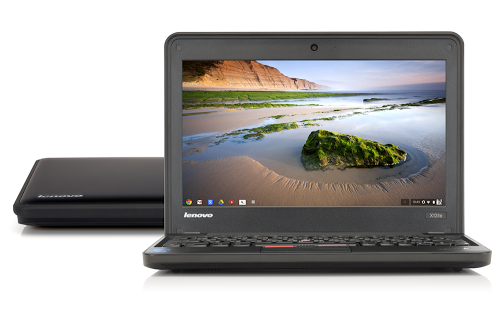With Lenovo's entry, Chromebooks are gaining popularity fast


The people have spoken, and they want Google's Linux-based, Chrome OS-powered Chromebooks.. The ARM-powered Samsung Chromebook is still Amazon's top selling laptop, and now Lenovo is getting ready to offer a ThinkPad Chromebook: the ThinkPad X131e for the education market.
The Chromebook ThinkPad X131e will have an as yet unidentified Intel processor. The Windows model that's the Lenovo ThinkPad Chromebook is based on uses an Intel Core i3-2367M processor. It also will come with an 11.6-inch, 1366x768 HD LED anti-glare screen, and three USB 3.0 ports. Lenovo also claims that it will weigh less than four pounds1 and have "battery life for the entire school day."
According to Caesar Sengupta, Google's Director of Product Management, "The new Lenovo ThinkPad X131e Chromebook will be available for $429 in the United States starting on February 26, 2013. Schools can add management and support from Google for a one-time cost of $30 per device."
So, why is Lenovo offering a Chromebook? In their press release, Lenovo executive director of ThinkPad marketing, Jerry Paradise, said that "this hardened ThinkPad Chromebook [is] a great computer for schools." In addition, thanks to "Google Apps for Education along with thousands of web apps in the Chrome Web Store, students can easily create documents, edit spreadsheets, view multimedia videos, create slide show presentations and view PDF files." Last, but far from least, Lenovo cited IDG which has found that Chromebooks "require 69 percent less labor to deploy and 92 percent less labor to support."
For cash-constrained school boards, the Chromebook ThinkPad sounds very attractive. So, why isn't Lenovo offering it to consumers or businesses as well? Who says they won't?
Anton Wahlman in The Street recently predicted that the Lenovo Chromebook would be nother nail in Microsoft's coffin. Wahlman wrote, "In 2013, Lenovo will break with its Microsoft Windows exclusivity and start offering PCs -- laptops and desktops alike -- based on Google's PC operating system." I've asked Lenovo to comment on Wahlman's predictions, but they have yet to reply.
Users, and not just pro-Linux or anti-Windows ones, are warming up to the Chromebook. To note one recent example, ZDNet's own Matt Baxter-Reynolds, wrote, "I wasn't expecting to like it, but in the end I loved it. The Chromebook could be the perfect post-PC device that has a keyboard." That sounds about right to me.
I've predicted from early on that the Chromebook could become a Windows PC killer. It looks like vendors and end-users are agreeing with me. Now that Lenovo, the world's number two PC vendor, has a toe in the Chromebook market, I'll be very curious to see how Lenovo's future Chromebook plans and those of other major PC vendors, such as Dell and HP, work out.
Related Stories:
- Lenovo announces ThinkPad Chromebook for schools
- The Chromebook -- it's like an iPad, but with a keyboard
- Samsung Chromebox gets updated with Intel Core i5 Sandy Bridge CPU
- Amazon's top selling laptop doesn't run Windows or Mac OS, it runs Linux
- Five Reasons why Google's Linux Chromebook is a Windows killer